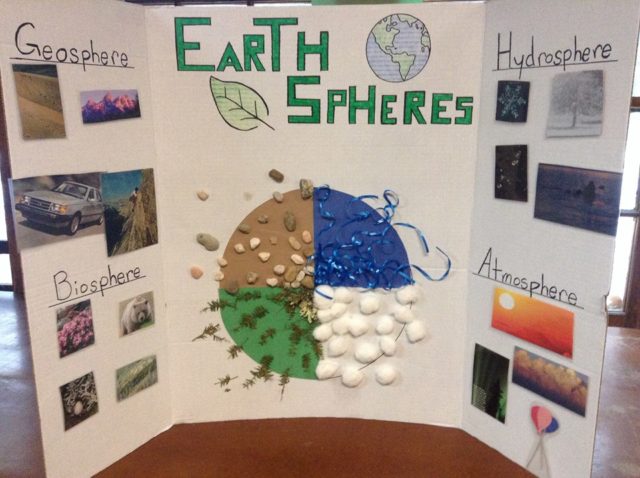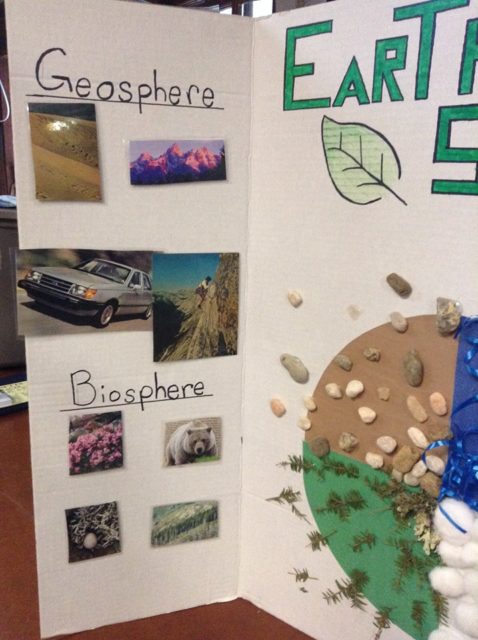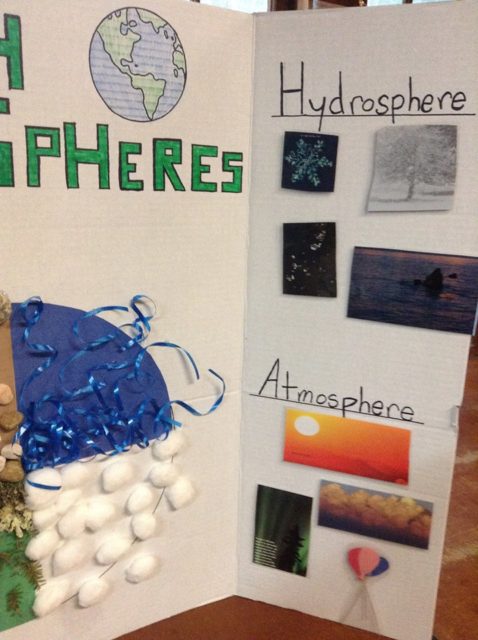Let’s take a few steps back to the very beginning. You are probably wondering the basis of the SCA’s environmental education model used to inspire the next generation of Earth Stewards. (That’s right we really want these students to learn!) I am going to fill you in on our little secret, hint hint, it all boils down to one simple subject, the Earth System!
Okay I lied the Earth System is not simple, in fact there are four main earth systems that we focus on each week in class and they are the hydrosphere, biosphere, geosphere and atmosphere. Students are introduced to the complexity of the natural world and the interconnectedness of the Earth System. For more information take a glance at the awesome poster below.

Geosphere ~ “ground”, non-living things like dirt, volcanoes, rocks, boulders
Hydrosphere ~ “water”, rain, ocean, lakes, rivers, snow
Biosphere ~ “life”, humans, animals, plants
Atmosphere ~ “air”, wind, space
The SCAers first lesson with the fourth graders was centered around the Earth System. By introducing each of the earth spheres the students are now able to develop an understanding of how the natural world is connected. This first lesson laid out the ground work for the rest of the education season.
Students were broken up into groups and given pictures from the earth sphere poster. Each group discussed where each picture belonged in the four earth spheres. One by one the students placed the magnetic pictures on the poster to be able to understand different examples for each earth sphere.


Each week there is an underlying lesson of what earth sphere relates to the topic being taught. For instance, the SCAers have exposed the fourth graders on lessons about birds (biosphere) water cycle (hydrosphere and atmosphere) and the workings of a decomposer (biosphere and geosphere). The earth system connects all of the lesson that we teach in class.
Just like sponges the students soaked up all of the knowledge we were throwing in their direction. The SCAers are able to measure how the students are retaining the information because of the reflective question of the week. This weeks question was, “The four spheres make up the earth, which one do you think is the most important?” Their Earth Steward Journal entry’s were eloquently written, for example:
“All of them because they all help each other. If one of them was missing the earth wouldn’t be complete. If life wasn’t here earth would be deserted. If rocks were missing the planet would be flooded. If water was missing, nothing would be able to survive. And if there wasn’t air, well every thing needs to be able to breath. These are my reasons for all of the spheres”
Really! That is what one of the students wrote. The students are understanding that the four spheres are equally important and connected for life to survive. By investigating and exploring the the Earth System students are well equipt to become better Earth Stewards to help the natural world. We reinforce the idea of becoming an Earth Steward with the EARTH STEWARDSHIP PLEDGE at the beginning of class. If you want to join us in the pledge just repeat after me: 
The SCAers start off every class with the Moose Salute to recite the Earth Stewardship Pledge!

I hope all of your questions have been answered. Like what the heck are you talking about!? Just ask any of the fourth graders in New Hampshire they are experts on the earth system. Or, I could let you in on the secret of where the SCAers receive their valuable information. Have you ever heard of this magical site called YouTube? There is a channel called Crash Course Kids that contains simple quirky informational videos. Enjoy!

